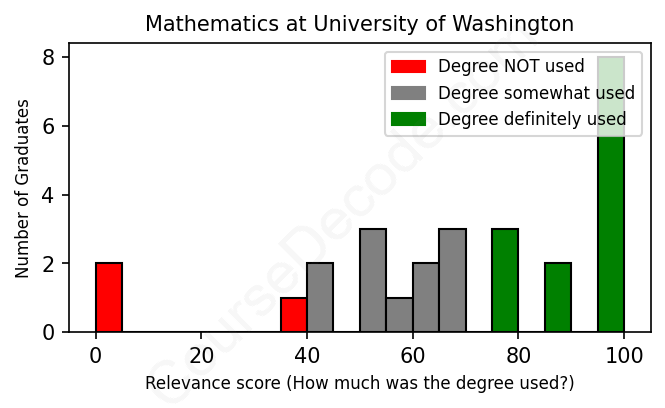
First, some facts. Of the Mathematics graduates from University of Washington we've analyzed , here's how many have used (or NOT used) their degree in their career:

These are estimates based on AI analysis of 27 LinkedIn profiles (see below).
The verdict? Slightly above average. Overall, with an average relevance score of 68%, Mathematics graduates from University of Washington have a slightly higher likelihood (+1%) of finding work in this field compared to the average graduate across all fields:
And for comparison, here's the chart for all profiles we've looked at across all degrees.
Also, after graduating, 44% of these graduates have pursued further education other than another Bachelor's degree (such as a Masters degree or other), compared to the average across all profiles of 35%. This suggests you may need more than just a Bachelors degree to be competitive as a Mathematics graduate.
See the details:
|
Relevance score: 75% We think this person has gone into a career highly relevant to their degree. We think this person has gone into a career highly relevant to their degree.
DEGREE INFOGraduated in 2023 from University of Washington with a Bachelor of Science - BS in Mathematics. Also pursued further education since (see below). JOB HISTORY SINCE GRADUATIONResearch Intern CICC Jun 2023 - Aug 2023 Research Assistant  Columbia Engineering Jun 2024 - Present FURTHER DEGREES DONE SINCE GRADUATINGMaster of Science - MSColumbia University 2023 - 2024 ABOUTNo information provided. |
The top 10 most common jobs done by the graduates we've analyzed (ranked most common to least) are:
After checking out the career paths of folks who graduated with a Mathematics degree from the University of Washington, you can see a pretty diverse mix of jobs. A lot of them ended up in tech-related roles, especially in software engineering, where mathematical concepts and problem-solving are key to developing algorithms and software solutions. Companies like Amazon and various startups seem to hire a bunch of Mathematics grads for positions like Software Development Engineer, which totally aligns with what you learn in your degree. On the other side, some graduates took paths in business roles—like Business Analysts—where they apply analytical and quantitative skills to real-world problems, making those positions quite relevant too.
However, not every job was strongly tied to mathematics. Some grads became Bakery Managers or worked in roles like Administrative Assistant, where the connection is pretty weak. Additionally, jobs in customer service or sales seem to utilize only a fraction of the skills studied in a Mathematics degree. Overall, while many Math grads found roles closely related to their studies, there were also plenty of cases where their degree wasn't the main focus of their job. So, it really depends on the individual and the path they choose after graduation—some stuck to math-heavy fields, while others ventured into areas where math skills played a minor role.
Here is a visual representation of the most common words in job titles for Mathematics graduates (this is across all Mathematics graduates we've analyzed, not just those who went to University of Washington):

Looking at the career trajectories of graduates from the University of Washington who studied Mathematics, it’s clear that many of them have carved out solid paths in relevant fields. In their first jobs after graduation, a lot of these graduates tend to land roles that utilize their analytical skills, especially in tech companies like Amazon and various software engineering firms. Many of them have jumped straight into positions like software engineers, business analysts, or data science roles, which are great for math majors. It’s also interesting to see some heading into finance and healthcare, suggesting that the versatility of a Math degree opens doors in various industries.
Fast forward about five to ten years, and many of these graduates seem to move into increasingly responsible positions, such as Senior Software Engineer, Business Intelligence Engineer, or even a Technical Program Manager. A few have ventured into teaching or started their own businesses, showcasing a more entrepreneurial side. However, there are some who took paths that seem a bit less related to math, like retail management or even roles at beauty and cosmetic companies. Overall, though, the majority appear to be doing quite well, with a solid number of them staying in roles directly tied to their math background, which is pretty encouraging for anyone considering this major!
Honestly, pursuing a Bachelor’s degree in Mathematics at the University of Washington, like many math programs, can be pretty challenging. You’re diving deep into concepts like calculus, linear algebra, and abstract math, which can get really intense. The workload often includes a lot of problem sets that require not just understanding theories but also applying them in complex ways. That said, if you have a solid foundation in math from high school and a genuine interest in the subject, you can definitely manage it! It's not necessarily harder than the average math degree, but it does require dedication and a willingness to tackle tough problems. So, be ready to put in some serious study time and be patient with yourself as you learn!
Most commonly, in the LinkedIn profiles we've looked at, it takes people 4 years to finish a Bachelor degree in Mathematics.
Looking at these University of Washington math grads, it seems like some have done pretty well for themselves, while others are still working their way up. The 2011 grad has climbed the ladder at Amazon and is likely making a good salary as a Business Intelligence Engineer, which is awesome for job security. The 2012 grad seems to be doing even better as an attending physician at Stanford Health Care, which typically pays really well. On the other hand, some of the more recent grads haven't landed jobs that scream big bucks yet, like those in education or early career IT roles. However, the tech grads from 2016 and onward are mostly finding themselves in solid tech positions that generally offer decent salaries. Overall, it looks like a mix of good earners and those still building their careers, but the opportunities definitely exist for those who are in the right industries.
Here is a visual representation of the most common words seen in the "about" section of LinkedIn profiles who have a Bachelor degree in Mathematics (this is across all Mathematics graduates we've analyzed, not just those who went to University of Washington). This may or may not be useful:

Here are all colleges offering a Bachelor degree in Mathematics (ordered by the average relevance score of their Mathematics graduates, best to worst) where we have analyzed at least 10 of their graduates:
| College | Score | Count |
|---|---|---|
 University of Florida University of Florida
|
83 | 11 |
 Penn State University Penn State University
|
74 | 13 |
 The University of Texas at Austin The University of Texas at Austin
|
68 | 23 |
 University of Washington University of Washington
|
68 | 27 |
 University of California, Berkeley University of California, Berkeley
|
66 | 10 |
 University of Minnesota-Twin Cities University of Minnesota-Twin Cities
|
65 | 15 |
 California Polytechnic State University-San Luis Obispo California Polytechnic State University-San Luis Obispo
|
64 | 11 |
 University of North Texas University of North Texas
|
51 | 11 |
 University of California, Riverside University of California, Riverside
|
44 | 11 |